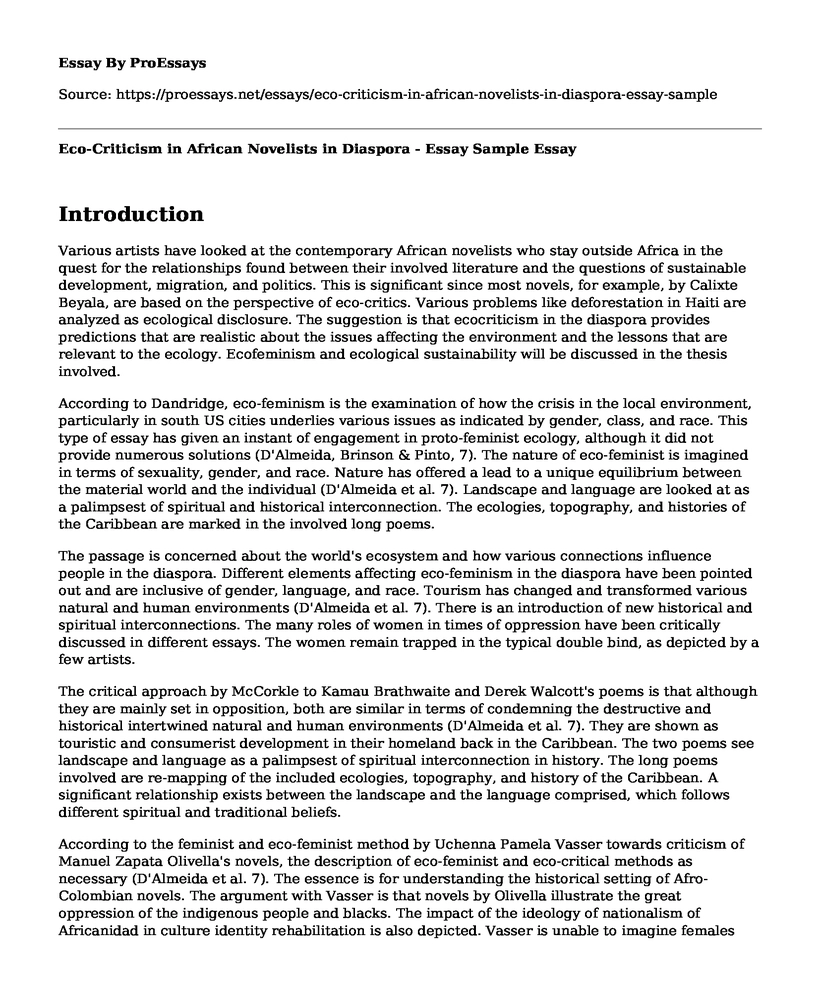Introduction
Various artists have looked at the contemporary African novelists who stay outside Africa in the quest for the relationships found between their involved literature and the questions of sustainable development, migration, and politics. This is significant since most novels, for example, by Calixte Beyala, are based on the perspective of eco-critics. Various problems like deforestation in Haiti are analyzed as ecological disclosure. The suggestion is that ecocriticism in the diaspora provides predictions that are realistic about the issues affecting the environment and the lessons that are relevant to the ecology. Ecofeminism and ecological sustainability will be discussed in the thesis involved.
According to Dandridge, eco-feminism is the examination of how the crisis in the local environment, particularly in south US cities underlies various issues as indicated by gender, class, and race. This type of essay has given an instant of engagement in proto-feminist ecology, although it did not provide numerous solutions (D'Almeida, Brinson & Pinto, 7). The nature of eco-feminist is imagined in terms of sexuality, gender, and race. Nature has offered a lead to a unique equilibrium between the material world and the individual (D'Almeida et al. 7). Landscape and language are looked at as a palimpsest of spiritual and historical interconnection. The ecologies, topography, and histories of the Caribbean are marked in the involved long poems.
The passage is concerned about the world's ecosystem and how various connections influence people in the diaspora. Different elements affecting eco-feminism in the diaspora have been pointed out and are inclusive of gender, language, and race. Tourism has changed and transformed various natural and human environments (D'Almeida et al. 7). There is an introduction of new historical and spiritual interconnections. The many roles of women in times of oppression have been critically discussed in different essays. The women remain trapped in the typical double bind, as depicted by a few artists.
The critical approach by McCorkle to Kamau Brathwaite and Derek Walcott's poems is that although they are mainly set in opposition, both are similar in terms of condemning the destructive and historical intertwined natural and human environments (D'Almeida et al. 7). They are shown as touristic and consumerist development in their homeland back in the Caribbean. The two poems see landscape and language as a palimpsest of spiritual interconnection in history. The long poems involved are re-mapping of the included ecologies, topography, and history of the Caribbean. A significant relationship exists between the landscape and the language comprised, which follows different spiritual and traditional beliefs.
According to the feminist and eco-feminist method by Uchenna Pamela Vasser towards criticism of Manuel Zapata Olivella's novels, the description of eco-feminist and eco-critical methods as necessary (D'Almeida et al. 7). The essence is for understanding the historical setting of Afro-Colombian novels. The argument with Vasser is that novels by Olivella illustrate the great oppression of the indigenous people and blacks. The impact of the ideology of nationalism of Africanidad in culture identity rehabilitation is also depicted. Vasser is unable to imagine females outside the traditional duties in the patriarchal system as involved. The depiction of women in the novels is that they are trapped.
The issues of pollution, sustainability, and ecology have become matters of concern in the recent past. Also, how they are introduced into the literature has become an increasing concern (D'Almeida et al. 7). Therefore, as an artist, it is essential to recognize in-depth the need for awareness and conservation that leads to re-use and aesthetic recycling of materials to create new and unique forms.
Works Cited
D'Almeida, Irene Assiba, Lucie Viakinnou Brinson and Thelma Pinto. Eco-Imagination, African and Diasporan Literatures and Sustainability. n.d. PDF.
Cite this page
Eco-Criticism in African Novelists in Diaspora - Essay Sample. (2023, Mar 29). Retrieved from https://proessays.net/essays/eco-criticism-in-african-novelists-in-diaspora-essay-sample
If you are the original author of this essay and no longer wish to have it published on the ProEssays website, please click below to request its removal:
- The Play King Lear Essay Example
- Torvald's View of His Wife and "A Woman's Place" - Critical Essay
- Literacy Instructional Plan Paper Example
- Film Analysis Essay on Deepwater Horizon
- The Yellow Wallpaper by Charlotte Gilman and the Bloodline by Ernest Gains Comparative Essay
- Movie Analysis Essay on John Wick
- Critical Essay on Madame Ginoux in Cafe de la Gare: Paul Gauguin 1888







